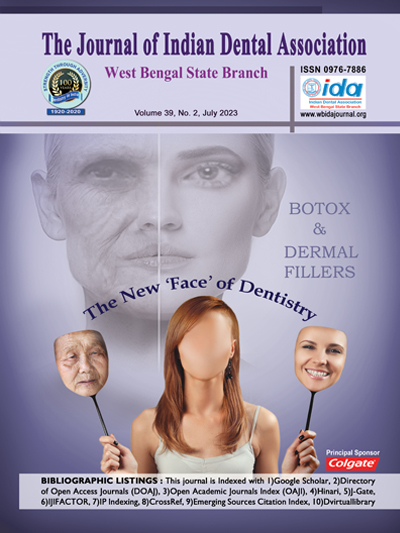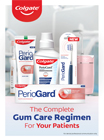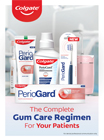Upcoming Events
1. Article Title.
2. Author Details.
3. Abstract.
4. Keywords.
5. Corresponding Author details.
July 2023
Volume : 39
No.: 2

Dr. Kurchi Mandal
Abstract: Discolored teeth affect the appearance of the individuals making them seek correction for same. Discoloration of anterior teeth can be due to a variety of reasons including genetic and environmental factors. This article describes correction of discolored teeth due to fluorosis utilizing combination of two conservative treatment approaches - microabrasion and in-office vital bleaching. The proposed technique improved the esthetics without requiring other invasive restorative procedures.
Dr. Ankita Das,Dr. Muhammed Mahshook AP,Dr. Sulthana T,Prof. (Dr.) Rupa Ghosh
Abstract: A tooth may migrate to occupy the position of another tooth in an arch. This phenomenon of site substitution by two neighbouring teeth is termed as Dental transposition. Transposition can be complete or incomplete . When both the crown & roots of two teeth exchange their placeit can be called a complete transposition. When only the crown is shifted, it is an incomplete transposition. This paper describes a case report of a 14 years old female patient reported with a partially impacted transposed lower horizontal canine with retained deciduous canine. In the Upper arch right deciduous canine was also present in patient's mouth and the permanent one was palatally erupted. So we extracted both deciduous canines and after one year of treatment, the transposed and partially impacted lower right permanent canine was brought into arch.
Dr. Anwesha Dey,Dr. Soumen Khan,Dr. Arkajit Goswami,Dr. Md Golam Hasan,Prof. (Dr.) Amal Kumar Chakrabarti
Abstract: A 14 year old boy with skeletal Class III malocclusion was treated in two phases. In phase one, rapid maxillary expansion (RME) and facemask was applied for intervention. After RME and facemask treatment, an improved skeletal Class III jaw relationship with reduction of the A point-nasion-B point (ANB) angle was obtained. Later in phase two, a full mouth, fixed, edgewise, self-ligating appliance was used to resolve the crowding without any extractions and give the patient overall an aesthetic profile and functional occlusion.
Dr. Shrabani Mandal,Dr. Nimmisree PN,Dr. Bhupender Kaur,Dr. Santanu Sarkar,Prof. (Dr.) Amal Kumar Chakrabarti
Abstract: The permanent canines are a key tooth in the maxillary arch that defines the smiles arc. Maxillary canines are the most common ectopic teeth in young people. Ectopic buccal eruption of maxillary canines is strongly associated with lack of space or crowding in the dental arch. This report demonstrates the management of a buccally erupted maxillary canines in an 12-years old female without sufficient space with non extraction procedure .In the anterior zone the relative positioning of the gingival margin has a critical role in the overall aesthetics of the patients. Combined orthodontic and periodontal procedures can be used to establish the proper levels of the gingival margins.
Dr. Anirban Biswas,Dr. Mekala Divya,Dr. Dimpleja J,Dr. Zarrin Rahnuma,Prof (Dr.) Prosanta Kumar Mondal,Prof (Dr.) Somen Roy Chowdhury
Abstract: Traumatic dental injuries are more common among children and adolescent age group, the treatment of such injuries critical and depends on the amount of the dental and adjoining periodontal tissue damage, traumatic dental injuries may extend from simple enamel fracture to the complex crown mass fracture, in later there is need of the treatment modality where the crown has been lost and remaining tooth structure is not enough to retain the restoration that is inadequate ferrule. Many treatment options can be considered like Surgical extrusion of the tooth, Orthodontic extrusion of the tooth followed by provisional restoration, Surgical Crown lengthening, extraction and provisional restoration. In such a situation orthodontic tooth extrusion is a less invasive, simple and successful treatment option in the child and adolescent age group. Here is a case report of the 12- year- old child presented with the fracture of the right upper central incisor and the remaining tooth structure was not enough to retain a restoration, in which we opted a sectional orthodontics.
Dr. Rishi Ray,Dr. Palak Khanna,Dr. Debabrata Sarkar,Dr. Surbhi Yadav,Dr. Mousum Mondol
Abstract: Osseointegration is the key for long term success of endosseous dental implants. Implant surface properties like roughness, topography, energy, and composition are the major surface features that influence the process of osseointegration. Several methods have been used to optimize implant surface roughness to increase surface area thereby improving the process of osseointegration such as additive and subtractive methods. Methods used for surface modifications of endosseous dental implants are vast and continuously evolving with the recently developed technologies. This article gives an overview of various surface modifications and current trends followed in the field oral implantology.












